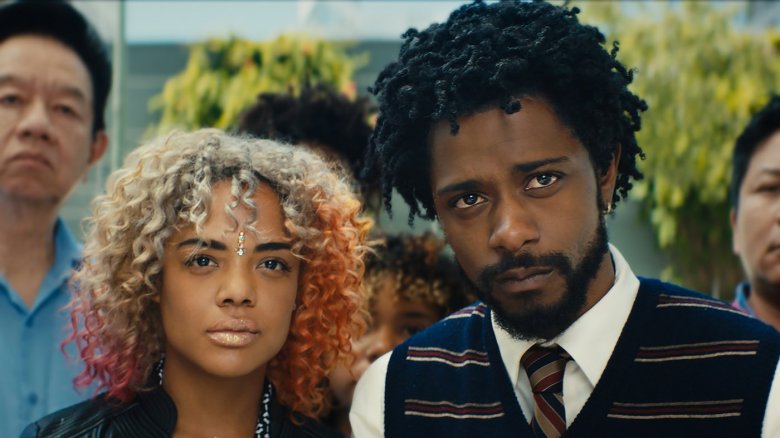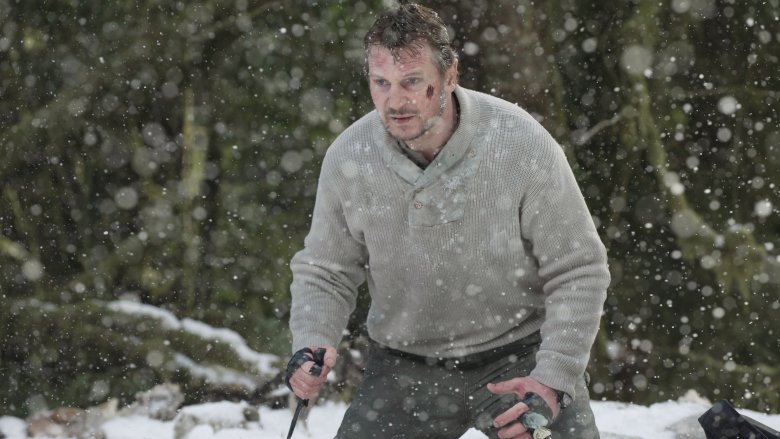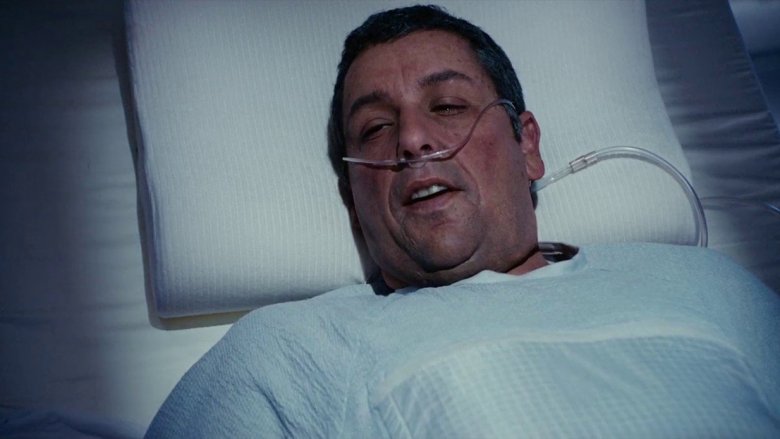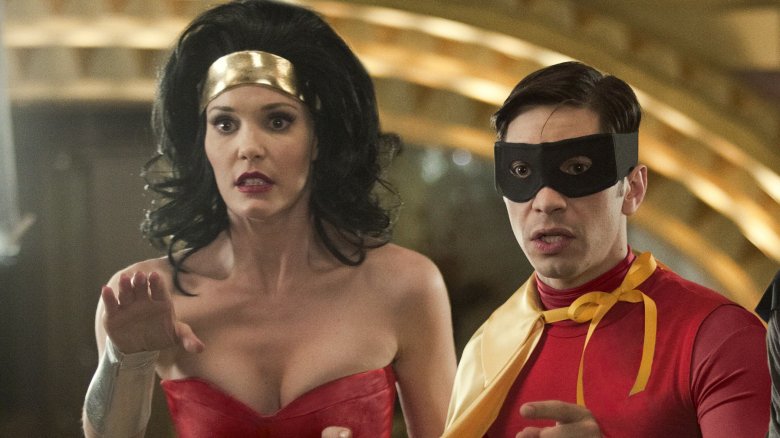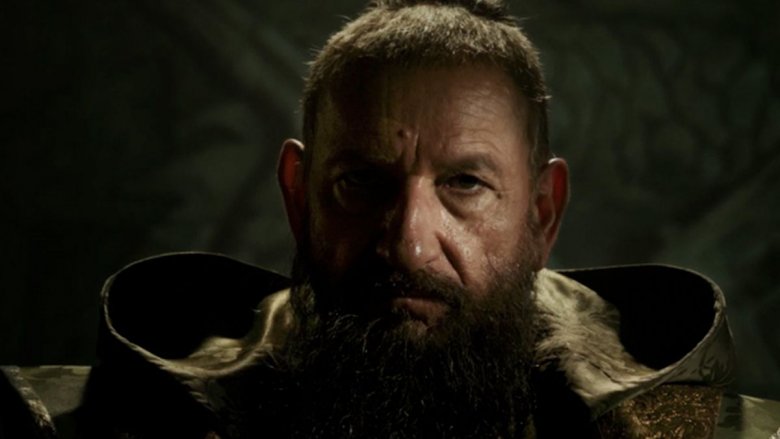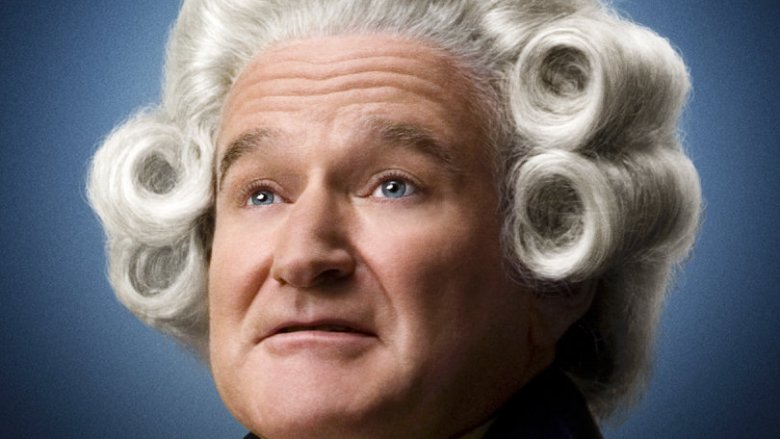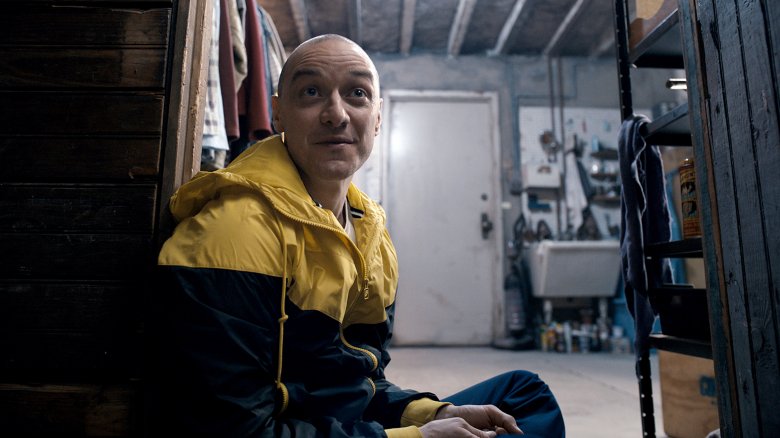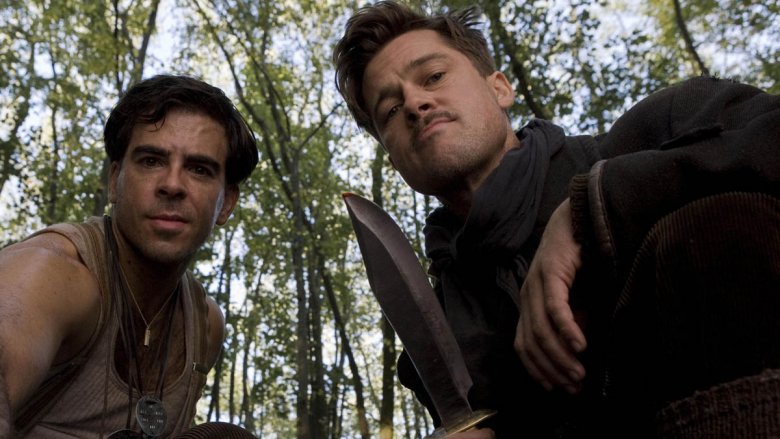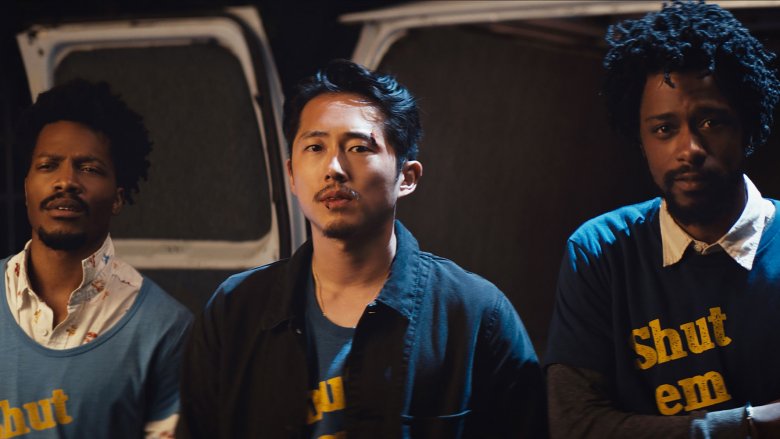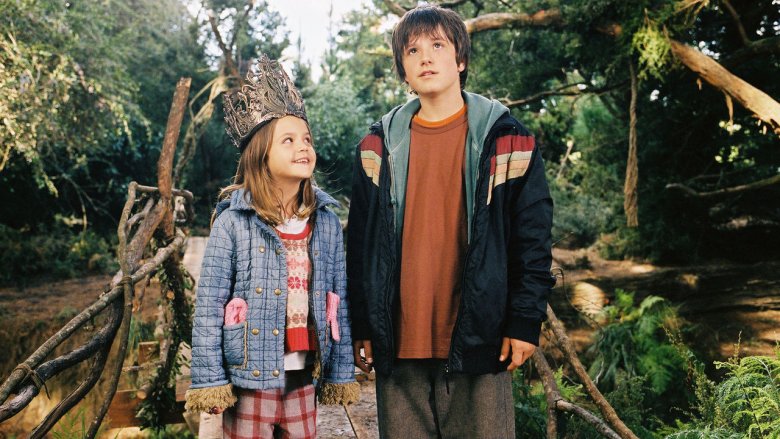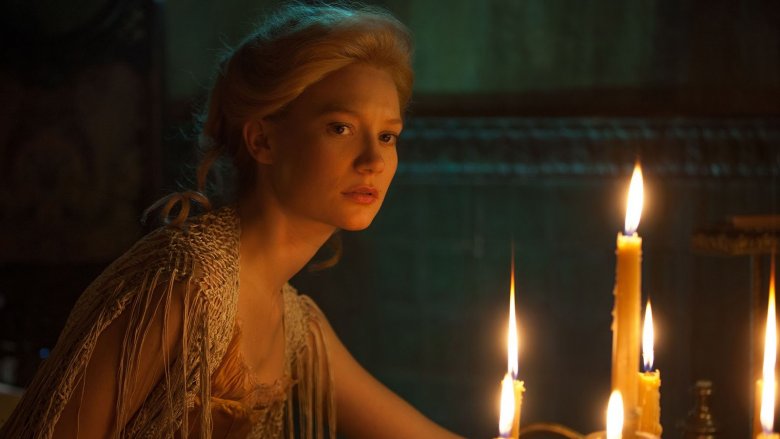Movies That Baited And Switched Fans
These days, it's harder to not know what happens in a movie than it is to be surprised by its twists. With all the set photos, copious trailers, actor interviews, and thousands of eager fan theorists ferreting out a film's plot, most big-budget movies are pretty predictable. That's not always the case, however. Occasionally, a tentpole blockbuster manages to completely bait and switch fans into seeing what feels like an entirely different movie.
Meanwhile, smaller productions, especially those directed by indie auteurs, use tricky marketing to make sure people actually watch their films and are surprised by them. It's not always a bad thing to be tricked by a film's marketing, but for better or worse, the films on this each pulled a major bait and switch. From a shocking mid-movie twist to a drama masquerading as an action film, here are some of the biggest swerves in movie history. And be warned, we'll be spoiling some of the films below, so make sure that you're all caught up on your "to watch" list (especially for Sorry to Bother You).
The Grey has less action than fans wanted
Not many fans could have anticipated that Liam Neeson would become a genuine action hero in the latter years of his career. That's exactly what happened in the mid-2000s and early 2010s, when the star of Schindler's List and Love, Actually took on a string of hard-hitting movies like Batman Begins, The A-Team, and Taken. That last one started an entire franchise, arguably on the strength of one single, very memorable monologue. That particular set of skills might have been the impetus for the marketing for The Grey, a film that seemed to promise Liam Neeson putting on improvised glass knuckles in order to punch wolves to death.
Instead, the actual film is as dour as the title suggests, while the wolf fighting that the trailers promised is restricted entirely to the closing minutes of the film. Worse, when put into context, the scene is much less "action hero facing off against his canine opponents" and more "suicide by wolf."
A dramatic turn in Click turned off fans
Plenty of comedic actors have made a successful transition into drama, but generally those roles are delineated enough for fans to know what they're getting. Adam Sandler had already put in a powerful performance in Paul Thomas Anderson's Punch Drunk Love and served ably as a romantic lead in 50 First Dates, but 2006's Click seemed like it would be a return to comedic form for fans of Sandler's wacky, pratfalling comedy.
The movie revolved around Michael (Sandler), an everyman father and husband who finds a "universal remote" that literally controls the universe. It might not have seemed like the funniest movie ever made, but the trailers undeniably presented Click as a comedy. The actual film, however, goes incredibly dark in the final half hour as Michael fast forwards through his life, missing major events in his children's lives, losing his wife to another man, and ultimately dying of a heart attack. Of course, he's able to go back in time, learn his lesson, and resolve to spend more time with his family in the vein of so many other feel-good comedies. Even so, Michael's grief at realizing all of the things he missed in his life while fast forwarding is way more grim than most fans were expecting.
Funny People isn't funny
Click wouldn't be the last time one of Sandler's attempts at dramatic acting would be marketed more like a comedy. Just three years later, Funny People tricked fans in almost exactly the same way. The major difference is that Funny People didn't just have a surprisingly grim climax like Click — almost the entire movie was a panoply of pain, selfishness, and false positive cancer results. The trailer made Funny People look like a feel-good flick starring some of the funniest people in Hollywood. It was even directed by Judd Apatow and starred Seth Rogen, just two years after the pair had collaborated on Knocked Up.
Anyone expecting a film as funny as previous Apatow projects would be disappointed. Sandler's lightly autobiographical George Simmons is relentlessly unpleasant to watch, made even worse by the movie's nearly two-and-a-half hour run time. Funny People might have starred some very funny people, but the film itself is painfully unfunny.
Movie 43 has plenty of stars but no laughs
It's not just trailers that can mislead fans into seeing a movie. Even something as innocuous as a movie poster and cast list can convince audiences that a movie is much better than it is. There's arguably never been a more packed cast than Movie 43, which almost certainly stars at least one actor or actress that you're a fan of. Elizabeth Banks, Chris Pratt, Richard Gere, Anna Faris, Hugh Jackman, Emma Stone, Uma Thurman, Naomi Watts, Kate Winslet, Kieran Culkin, John Hodgman, and dozens more all appear. Behind the camera, comedic talents like Bob Odenkirk, James Gunn, and Peter Farrelly wrote and directed various segments of the film. The sheer star power involved seems to almost guarantee that the final product would at least be interesting.
Instead, Movie 43 is a legendarily terrible movie and a black spot on each one of those many resumes. Veteran movie critic Richard Roeper called it "the Citizen Kane of awful." It's a truly unpleasant movie, and reading about the real-life story of how the film was made is a much better use of one's time than actually watching it. Fans who turned out to see their favorite actor or actress poke fun at themselves most likely found the need for a new performer to follow instead.
Iron Man 3 hid the true villain in plain sight
Iron Man fans were thrilled when the Mandarin was announced as the primary antagonist of Iron Man 3. The Armored Avenger has had many arch-nemeses over decades of comic book adventures, but arguably none were more threatening and mysterious than the Mandarin. Even better, veteran actor Ben Kingsley was cast to bring the character to life, and he certainly looked the part when the first trailers dropped.
However, it turned out that the brain trust behind the Marvel Cinematic Universe had managed to pull one over on the audience — Kingsley wasn't actually playing the Mandarin at all. Instead, Kingsley was playing a character who was hired to play the Mandarin in the service of the film's actual big villain, Aldrich Killian. The Mandarin himself ended up being a bait-and-switch for Iron Man aficionados that was made all the more impressive in how tight-lipped everyone involved in the production was able to remain while marketing the film.
Man of the Year can't live up to its premise
What would happen if Jon Stewart ran for president? That seems to be the question asked by Man of the Year, a 2006 film that follows Robin Williams as Tom Dobbs, a Daily Show-esque satirist who accidentally runs for president... and wins. It seems like a rich set-up for plenty of easy jokes about political quagmires, hypocrisy, and democracy at large. It seems impossible that the final product would be largely devoid of laughs, but that's exactly what it is.
The movie quickly pivots into a conspiracy thriller as Dobbs has to figure out how to actually govern while dealing with the larger controversy surrounding his victory. Anyone hoping for the sharp wit of Dr. Strangelove or even Idiocracy would've walked away disappointed. It's a bizarre choice for a movie with such an interesting premise. What would happen if Jon Stewart ran for president? We don't know, but hopefully it would be more interesting than Man of the Year.
Split was a sequel
Director M. Night Shyamalan had a tough decade following 2002's Signs. While his previous movies, Unbreakable and The Sixth Sense, had been greeted with largely positive reviews and solid audience turnout, Lady in the Water, The Happening, and The Last Airbender were all roundly blasted by critics and audiences alike. But after some time away, Shyamalan kicked off a comeback with 2015's The Visit, a well-received horror film shot on a mere $5 million budget.
Split seemed geared to continue the writer-director's fresh hot streak with a similarly low-budget horror flick, this time focusing on Kevin, a man with multiple personality disorder who kidnaps a group of teenage girls. But for anyone who felt nostalgic for the old Shyamalan twist, Split proved itself to be a true return to form in more ways than one. As revealed in the final moments of the film, Split wasn't just a lean, low-budget horror movie — it was actually a stealth sequel to Shyamalan's well-regarded superhero film, Unbreakable, and was the second part of a brand-new franchise. The next entry in the franchise, Glass, hits theaters in 2019, and we wouldn't be surprised if Shyamalan has yet another surprise in store for fans to discover upon its release.
Marley and Me didn't warn dog owners
It's really not hard to convince a dog-lover to watch a dog movie. Flash a couple scenes of whatever adorable pooch you've managed to wrangle on set, cast a couple of well-known actors as the dog's owners, and you're basically guaranteed some level of box office success, regardless of the film's quality. That's certainly the tack that 2008's Marley and Me took, with plentiful shots of the painfully adorable Golden Retriever (Marley) and his owners, played by Jennifer Aniston and Owen Wilson (Me). In fact, for a significant chunk of the film's running time, Marley and Me is likely to please any dog-loving moviegoer as the dog bounds across the screen and into various hijinks.
Unfortunately, the film also has one of the saddest dog-related endings since Lassie. The ending of Marley and Me is also the ending of Marley himself — the dog is euthanized to spare him a more painful, illness-related death in a finale likely to leave dog-lovers sobbing in their seats.
Inglourious Basterds wasn't about the Basterds
After Kill Bill, Kill Bill Vol. 2, and Death Proof, cinephiles and mainstream audiences alike were flush with anticipation for writer-director Quentin Tarantino's next big project. "Big" was definitely the adjective to use when fans found out that his next film would be a World War II action-drama about a group of Nazi-hunting Jewish soldiers on a secret mission to kill Adolf Hitler. Kill Bill's action sequences had shown that Tarantino had more than just a knack for dialogue and non-linear plotting, so fans everywhere expected Inglorious Basterds to be bloody and spectacular.
When the film actually arrived, though, audiences were shocked to found out that the titular "Basterds" weren't really the focus of the film at all. In fact, a sizable chunk of the movie's focus is on Shosanna, a young Jewish woman trying to survive and enact her own revenge against the Nazis. Chris Hewitt at Empire called it "an action movie that has barely any action," while Scott Tobias at NPR pointed out that the Basterds are "men of action who rarely get a chance to act."
Sorry to Bother You is a completely different movie than it seems
Sorry to Bother You looked like a very strange movie from the very first trailer. The movie seemed to follow Cassius, a black telemarketer who taps into his secret "white voice," a surrealistic overdubbing effect that convinces people to quite literally buy what he's selling. What looked like a slightly fantastical spin on the dangers of working for an uncaring corporate overlord actually ended up being much, much stranger. (One final spoiler warning for a plot twist that's better experienced than summarized.)
It turns out that the evil conglomerate that Cassius works for is playing a much bigger and crazier game than Cassius (and the audience) could even imagine: they're mutating factory workers into grotesque horse people in order to engineer a separate civilization with its own unique culture, which they'll then use as unlimited slave labor to keep costs down. The movie becomes a shocking anti-capitalist screed that no doubt surprised audience members who thought they were buying tickets for a goofy comedy.
Bridge to Terabithia isn't a fantasy adventure
Bridge to Terabithia looked like an easy way to entertain the kids for an afternoon, with a colorful trailer that seemed to promise fantastical delight for all ages. If you actually dropped your kid off at the theater to see the film, however, you might have been surprised when they came back with some tough-to-answer questions about death. That's because Terabithia isn't a high-fantasy movie like Lord of the Rings or The Lion, The Witch, and the Wardrobe; its fantasy trappings are entirely imaginary and explicitly a way to recover from the sudden trauma of a child dying.
Anyone familiar with the source material would have known that the film isn't exactly set in a wonderland, but there were plenty of audience members who hadn't read the original novel. In fact, the trailers were so egregiously misleading compared to the film's actual tone that the filmmakers themselves disavowed the ad campaign for Terabithia. Those who actually saw the film generally enjoyed it, but any audience member excited to see a spectacular adventure was sure to walk away disappointed.
Crimson Peak wasn't as scary as it seemed
Guillermo del Toro's name as a filmmaker carries some fairly specific connotations. Anyone who saw Blade 2, Hellboy, or Pan's Labyrinth could immediately tell that del Toro loves practical effects and making movie monsters. While many of his films skew closer to drama or action than outright horror (with a scary exception in The Devil's Backbone), it's easy to see that the filmmaker has a true affection for the tropes and trappings of horror films.
When the first trailers for Crimson Peak were released, it seemed immediately apparent that del Toro was making a movie inspired by Gothic horror. That ended up not being the case, however, as Crimson Peak was far more Gothic romance than Gothic horror. While the two genres share a love of shadowy mansions and spooky buttresses, Gothic romance films tend to have a lot fewer jump scares. Those expecting a genuine fright fest upon release were actually treated to a slow-burning tale of vengeance, incest, and long-buried secrets.
